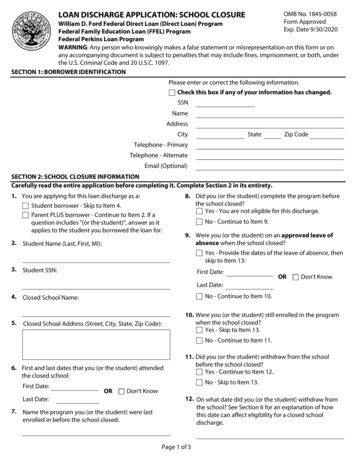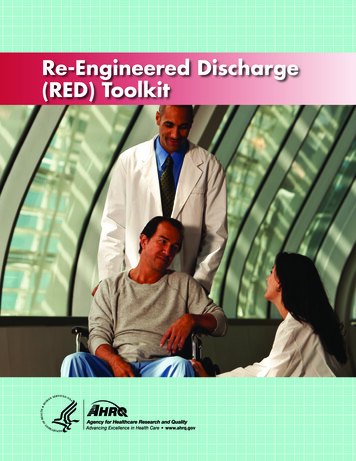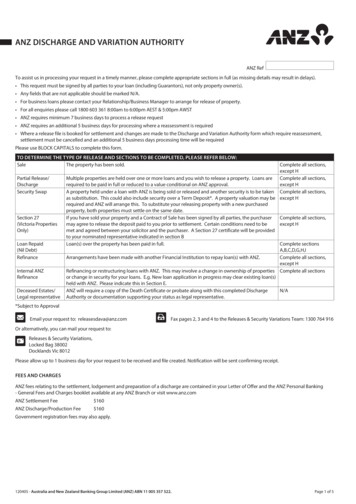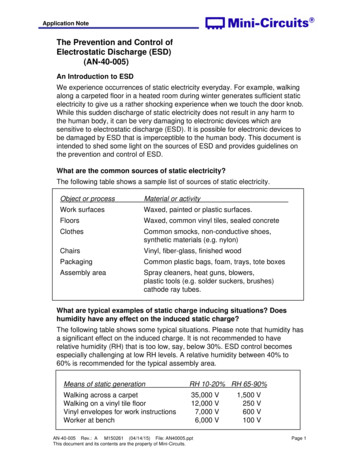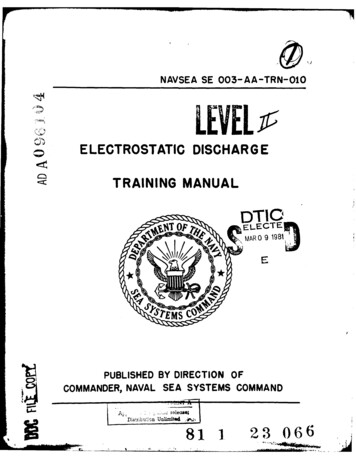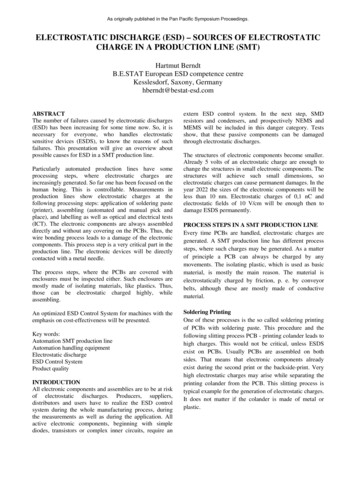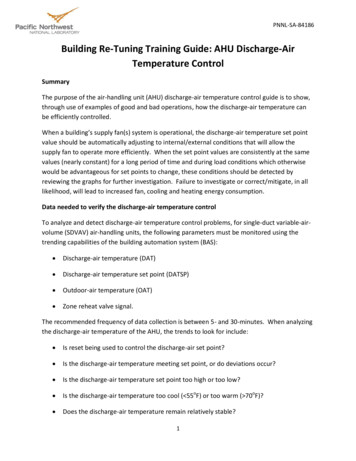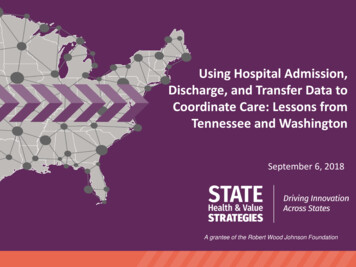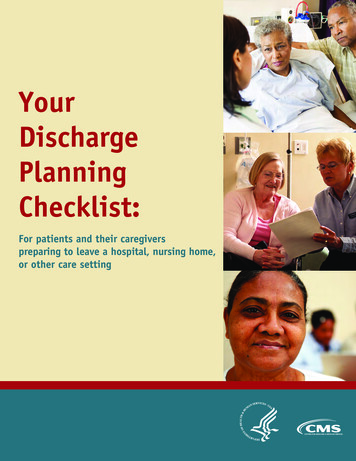
Transcription
YourDischargePlanningChecklist:For patients and their caregiverspreparing to leave a hospital, nursing home,or other care setting1
Name:Reason for admission:During your stay, your doctor and the staff will work with you to plan foryour discharge. You and your caregiver (a family member or friend who maybe helping you) are important members of the planning team. You and yourcaregiver can use this checklist to prepare for your discharge.Instructions: Use this checklist early and often during your stay. Talk to your doctor and the staff (like a discharge planner, social worker, or nurse)about the items on this checklist. Check the box next to each item when you and your caregiver complete it. Use the notes column to write down important information(like names and phone numbers). Skip any items that don’t apply to you.Action itemsCare after dischargeAsk where you’ll get care after you’re discharged. Do you have options (like home health care)?Tell the staff what you prefer.If a caregiver will be helping you after discharge, write down their name and phone number.Your healthAsk the staff about your health condition and what you can do to get better.Ask about problems to watch for and what to do about them. Write down a name and phone numberof a person to call if you have problems.2Notes
Action items NotesUse “My drug list”on page 5 to write down your prescription drugs, over-the-counter drugs, vitamins,and herbal supplements. Review the list with the staff. Tell the staff what drugs, vitamins, or supplementsyou took before you were admitted. Ask if youshould still take these after you leave. Write down a name and phone number of a personto call if you have questions.Recovery & supportAsk if you’ll need medical equipment (like a walker). Who will arrange for this? Write down a name andphone number of a person you can call if you havequestions about equipment.Ask if you’re ready to do the activities below. Circle the ones you need help with, and tell the staff: Bathing, dressing, using the bathroom, climbing stairs Cooking, food shopping, house cleaning, paying bills Getting to doctors’ appointments, picking upprescription drugsHave support in place that can help you. See “Resources” on page 6 for more information.Ask the staff to show you and your caregiver any other tasks that require special skills (like changinga bandage or giving a shot). Then, show them youcan do these tasks. Write down a name and phonenumber of a person you can call if you need help.Talk to a social worker if you’re concerned about how you and your family are coping with yourillness. Write down information about supportgroups and other resources.Talk to a social worker or your health plan if you have questions about what your insurance will coverand how much you’ll have to pay. Ask about possibleways to get help with your costs.3
Action items NotesAsk for written discharge instructions (that you can read and understand) and a summary of your current healthstatus. Bring this information and your completed“My drug list” to your follow-up appointments.Use “My appointments” on page 5 to write down upcoming appointments and tests.For the caregiverWrite down and discuss with staff any questions you have about the items on this checklist or onthe discharge instructions.Can you give the patient the help he or she needs? What tasks do you need help with? Do you need any education or training? Talk to the staff about getting the help you needbefore discharge. Write down a name and phone number of a personyou can call if you have questions.Get prescriptions and any special diet instructions early, so you won’t have to make extra trips after discharge.More information for people with MedicareIf you need help choosing a home health agency or nursing home: Talk to the staff. Visit Medicare.gov to compare the quality of home health agencies, nursing homes, dialysisfacilities, inpatient rehabilitation facilities, and hospitals in your area. Call 1-800-MEDICARE (1-800-633-4227). TTY users can call 1-877-486-2048.If you think you’re being asked to leave a hospital or other health care setting (discharged) too soon:You may have the right to ask for a review of the discharge decision by the Beneficiary and Family Centered CareQuality Improvement Organization (BFCC-QIO) before you leave. A BFCC-QIO is a type of quality improvementorganization (a group of doctors and other health care experts under contract with Medicare) that reviewscomplaints and quality of care for people with Medicare. To get the phone number for your BFCC-QIO, visitMedicare.gov/contacts, or call 1-800-MEDICARE. You can also ask the staff for this information. If you’rein a hospital, the staff should give you a notice called “Important Message from Medicare”, which containsinformation on your BFCC-QIO. If you don’t get this notice, ask for it.For more information on your right to appeal, visit Medicare.gov/appeals.4
My drug list Filled out on:Use the space below to list all prescription drugs, over-the-counter drugs, vitamins, and herbal supplementsyou take. Include the name of the drug, what it’s for, how often you take it, and how and when you take it.Review this list with the staff.If you have Medicare and limited income and resources, you may qualify for Extra Help to pay for yourMedicare prescription drug coverage. For more information about Extra Help, visit Medicare.gov.My appointmentsUse this space to write down the dates and times of your upcoming appointments. Include anyappointments and tests you may be getting, as well as any necessary phone numbers.5
ResourcesThe agencies listed here have information on community services,(like home-delivered meals and rides to appointments). You canalso get help making long-term care decisions. Ask the staff inyour health care setting for more information.Area Agencies on Aging (AAAs) and Aging and Disability Resource Centers (ADRCs):Helps older adults, people with disabilities, and their caregivers. To find the AAA or ADRC in yourarea, visit the Eldercare Locator at eldercare.acl.gov, or call 1-800-677-1116.Medicare: Provides information and support to caregivers and people with Medicare.Visit Medicare.gov.Long-Term Care (LTC) Ombudsman Program: Advocates for and promotes the rights ofresidents in LTC facilities. Visit ltcombudsman.org.Senior Medicare Patrol (SMP) Programs: Works with seniors to protect themselves fromthe economic and health-related consequences of Medicare and Medicaid fraud, error, andabuse. To find a local SMP program, visit smpresource.org.Centers for Independent Living (CILs): Helps people with disabilities live independently.For a state-by-state directory of CILs, visit ate Technology Assistance Project: Has information on medical equipment and otherassistive technology. Visit resna.org, or call 1-703-524-6686 to get the contact information inyour state.National Long-Term Care Clearinghouse: Provides information and resources to plan foryour long-term care needs. Visit longtermcare.gov.National Council on Aging: Provides information about programs that help pay forprescription drugs, utility bills, meals, health care, and more. Visit benefitscheckup.org.State Health Insurance Assistance Programs (SHIPs): Offer counseling on healthinsurance and programs for people with limited income. Also help with claims, billing, andappeals. Visit shiptacenter.org, or call 1-800-MEDICARE (1-800-633-4227) to get your SHIP’sphone number. TTY users can call 1-877-486-2048.Medicaid: Helps with medical costs for some people with limited income and resources. To findyour local office, visit Medicare.gov/contacts, or call 1-800-MEDICARE.You have the right to get Medicare information in an accessible format, like large print, Braille, or audio. You also have the right tofile a complaint if you feel you’ve been discriminated against. Visit ion-notice,or call 1-800-MEDICARE (1-800-633-4227) for more information. TTY users can call 1-877-486-2048.Paid for by the Department of Health & Human Services.CMS Product No. 11376Revised March 2019
shiptacenter.org, or call 1-800-MEDICARE (1-800-633-4227) to get your SHIP’s phone number. TTY users can call 1-877-486-2048. Medicaid: Helps with medical costs for some people with limited income and resources. To find your local office, visit Medicare.gov/contacts, or call 1-800-MEDICARE. You have the right to get Medicare information in an accessible format, like large print, Braille, or .File Size: 276KBPage Count: 6Explore furtherIDEAL Discharge Planning Overview, Process, and Checklistwww.ahrq.govTool 10: Discharge Process Checklist - AHRQwww.ahrq.govDISCHARGE PLANNING TOOLKIT - Lifespan Networkwww.lifespan-network.orgBest Practices Discharge Planning Manual FINALwww.myflfamilies.com5 Hospital Discharge Planning Tools to Improve Care Managementblog.cureatr.comRecommended to you based on what's popular Feedback



